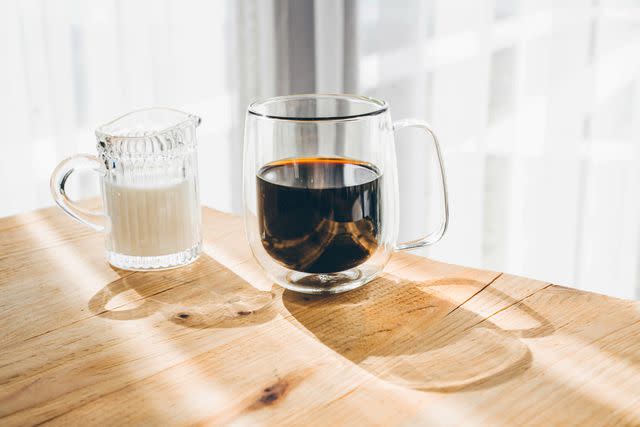Decaf Coffee Could Potentially Be Unsafe for Human Consumption
Health advocacy groups are petitioning the FDA to ban methylene chloride, a chemical compound used in the decaffeination process. Here's what you need to know.
Skipping out on caffeine? Well, your coffee may be served with a side of chemicals.
Decaffeinated coffee beans are standard coffee beans with the caffeine stimulant removed, and the way that chemical is removed, well, can be controversial. The chemicals used in the process have been linked to several health risks, which can be worrisome for the 26 million Americans who drink decaffeinated coffee each day. Recent discussions of banning methylene chloride, a likely carcinogen often used in the decaffeination process, have confused and concerned decaf drinkers.
The National Coffee Association, a trade association for the coffee industry dating back to 1911, isn’t here for any proposed bans. The pro-joe group released a statement pushing coffee consumption of any type, including decaf, thanks to its longevity benefits and other healthy associations.

Tom Werner / Hinterhaus Productions / Getty Images
Related: The Best Places to Buy Coffee Online, According to Our Highly Caffeinated Experts
Of course, consumers can decide what’s worth the risk — or if a risk is apparent at all — by learning a bit more about decaf coffee. Here’s what you need to know.
What is the European Method of Decaffeination?
The European Method of Decaffeination, also called the Indirect-Solvent Process, is a common way to remove caffeine from coffee beans before roasting. Used widely (not just in Europe), it’s the decaffeination method that has environmental and health activists concerned. This process starts by boiling coffee beans and then soaking the softened beans in chemicals such as methylene chloride or ethyl acetate (also used in nail polish remover). These compounds bind to the caffeine from the beans, extract it, and then the beans are rinsed to remove chemical residue, dried, and roasted.
Currently, the FDA allows a small amount of methylene chloride to remain on beans for consumers, 10 parts per million (0.001%), but that tiny number is currently up for debate, in terms of health and safety.
What is methylene chloride, the chemical compound used in the decaffeination process?
Methylene chloride, also called dichloromethane, is a chemical compound. It’s a clear liquid that, in addition to removing the caffeine from coffee, is also used in paint removers, paint strippers, metal cleaners, and pharmaceuticals.
Related: The Best Programmable Coffee Makers for 2024, According to Our Tests
While that may not sound super appealing for a morning beverage, the American Chemical Society says that despite the chemical being potentially carcinogenic, removing residual chemicals from coffee doesn't present a hazard: It is quite easy to make methylene chloride safe for human consumption because the "solvent’s volatility makes it easy to remove residual solvent." And any remaining solvent "is well below the 10-ppm concentration allowed by the US Food and Drug Administration."
What are the harmful effects of methylene chloride on the human body?
Methylene chloride can be harmful to humans. The colorless liquid has been proven to cause eye, skin, liver, and heart injuries and damage, according to the CDC. Direct exposure to the chemical can also cause drowsiness, dizziness, numbness, tingling limbs, and nausea. And "severe exposure" can pose more dangerous hazards and even lead to loss of consciousness and death.
Related: How to Make French Press Coffee, According to Experts
Consumers aren’t typically exposed to such high levels of methylene chloride, and the risks are more pertinent to pharmaceutical workers, factory workers, and those working in construction. Third-wave roasters, including Blue Bottle and Counter Culture, use this method.
What's being done about it? And what's going on with the petition against methylene chloride?
In January 2024, the FDA filed a petition proposing a major change to food additive regulations. The petition requests that solvents including methylene chloride, benzene, ethylene dichloride, and trichloroethylene be prohibited or restricted in American food and drugs, as these compounds have been connected to causing cancer in humans and animals. The Environmental Defense Fund, Breast Cancer Prevention Partners, Center for Environmental Health, and Environmental Working Group all advocate for the change.
Are there other ways to decaffeinate coffee? What is natural decaffeination?
The standard European Method of Decaffeination, using methylene chloride, isn’t the only way to create decaffeinated beans.
Related: 10 Top Cities for Coffee, According to the Experts
The CO2 decaffeination process and Swiss Water method are two popular, chemical-free ways to remove caffeine from coffee beans. The CO2 method steams or soaks unroasted coffee beans and then pumps carbon dioxide into a container, essentially creating a sparkling water that leaches the caffeine from the beans. The nontoxic water is then dumped and decaf beans are ready for roasting. The Swiss Water process is a slower method, which puts green coffee beans in water and lets the caffeine soak out over the course of many hours.

Maria Korneeva / Getty Images
The Environmental Defense Fund, Breast Cancer Prevention Partners, Center for Environmental Health, and Environmental Working Group all advocate for the banning of methylene chloride.What is the Clean Label Project and what does it do?
There are several efforts and initiatives to produce safe decaf coffee without chemicals. The Clean Label Project, a nonprofit organization, awards brands that create consumer products that use far fewer or no toxins that are considered safe in minimum doses by the FDA. The organization tests products for chemicals and residue, and helps determine if products are free of potential toxins.
Related: 10 Best Coffee Brands From All Over the Country
In terms of decaf coffee, the Clean Label Project tested several well-known coffee brands for methylene chloride. The chemical was detected in AmazonFresh Decaffeinated Colombia, Kirkland Signature Decaffeinated Dark Roast, Maxwell House Decaffeinated Original Roast, Café Bustelo, and several others.
Luckily, even more brands passed the test for not containing the chemical, including Starbucks, Dunkin’ Donuts, Folgers, Caribou Coffee, ILLY, and many more.
What can concerned decaf coffee drinkers do?
Worried about what’s in your decaf? You shouldn’t have to be. For now, concerned decaf drinkers can pick brands that the Clean Label Project has verified to be free of methylene chloride. Packages of decaf coffee labeled solvent-free, chemical-free, Swiss-water, or even organic can also be safer to consume.
For more Food & Wine news, make sure to sign up for our newsletter!
Read the original article on Food & Wine.

